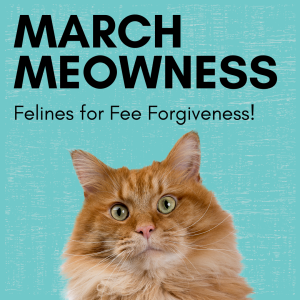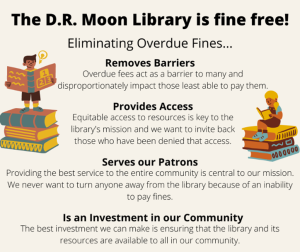Image from; Graham, R.(2017, February, 06). Long Overdue. Slate. https://slate.com/culture/2017/02/librarians-are-realizing-that-overdue-fines-undercut-libraries-missions.html.
The use of library fines in public libraries has been in place for quite some time in the US. Fines for lost or overdue books were a way to bring in money during economic down turns as seen in the 1930’s and onwards (Wiegand,2015) they were also incentive for users to bring back books. Though public libraries are

Image from: Worcester Public Library. (2024, March). March Meowness Felines for Fee Forgiveness!. https://mywpl.org/cat-month
seeing that fines might be hurting user more then helps this is way more public libraries or work with people to less the fines or out right getting ride of fines for overdue book with creative ideas. For example, in March 2024 the Worcester Public Library promoted March Meowness Felines for free forgiveness. The library accepted both digital and hand drawn images of cats or animals like a tiger or a lion.
But why would public libraries want to wave these fines? Fines can be seen as an extra source of income for an already struggling public service and teaching users about responsibility. There are many reasons why public libraries ditching fines, but to keep it short I will focus how fines block access to books to people who really need them. I will also show how some public libraries are doing after going fine-free.
Providing access to books and information is what any library strives for but fines create a barrier for communities that rely on and use the library. These communities, for example, are low-income people and caregivers. In an updated post the American Library Association (ALA) in 2019 notes that libraries:
resources provided directly or indirectly by the library, regardless of format or method of delivery, should be readily and equitably accessible to all library users. Imposing any financial barrier may disadvantage users, and libraries of all types—public, school, and academic—should consider eliminating barriers that limit access to library resources and other services. (American Library Association,2019)
Many libraries had already started to go fine free long before the ALA post. In Ruth Grahan’s 2017 article Long Overdue ,a hand full of public libraries had already eliminated or reduced fines. Many of the users of the public library are children or people who need to use the computer but are unable to as they had their libraries cards bocked for overdue books. Some see fines as another debt to pay many users won’t come back as they know they had a fine to pay thus borrowing them from renting books. Fines are linked to other accounts, for example if a parent or guardian has a fee on their library card it would affect the child library card making the child unbale to check out books. There have been many studies and tips on how libraries can get started with going fine free. The Colorado State Library has a great outline on how they addressed the issue of helping with getting children and parents to feel at ease coming to libraries and checking out books without having to worry about fines. Some examples this study gave to address this issue were:
- Children and young adults get their own library cards to check out a set number of books at a time.
- Fine do not apply to any children’s books
- Waving fines on any children’s (selected) materials including lost or damaged materials.
Effects of being fine free
In 2024 information on how libraries are doing after going fine free for example at in St. Paul Minnesota. This public library went fine free in 2019, and that applied to all users of the library. The library saw about a 30% increase in people coming in, using their services and checking out books. It should be noted that not all public libraries can see the same responses as the St. Paul public library in Minnesota, as users still might not come back to library, even if they there’s no fees. In the end people bring in overdue books allowing others to be able to read them.
Reflection
With the growing number of public libraries going fine free this breaks down barriers so that more of the public can have access to books and services. While some libraries have slowly rolled out ideas, starting with children’s books and later applying no fines to other books and materials, While some parts of the community benefit more than others, in the end, it helps the community as a whole. The image below is a great summary of what waving fines does over all:

Image from: D.R. Moon Memorial Public Library. (n.d.).We are fine free. Stanley library. https://stanleylibrary.org/fine-free/.

I live in an area where a neighboring county system has fines, and we don’t. Our patrons appreciate being able to use the library without the added worry of overdue or late fines. We only charge if an item is lost or damaged, and then sometimes that is waived if the book is circulated a lot or patron has no record of multiple books damaged.
Hi Kimberly, very compelling use of punctuation 🙂 I always thought fines were a way of hurting the lower classes the most. It doesn’t encourage trust, it implies patrons will misuse access to information and cannot be trusted. Thank you for your research and reflections!